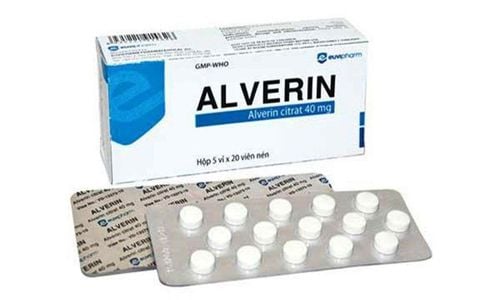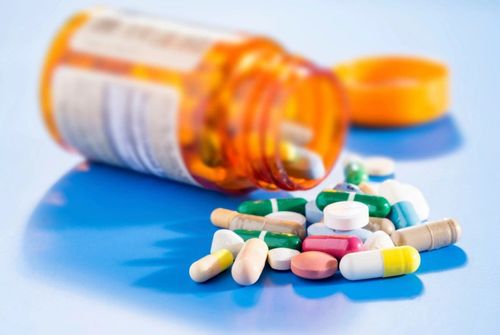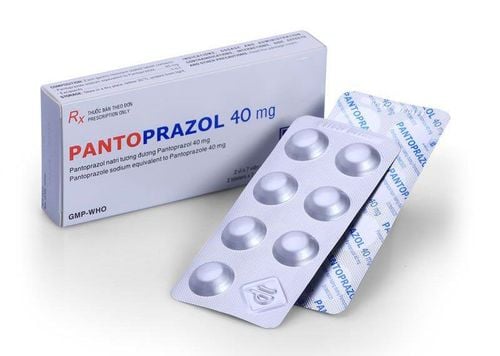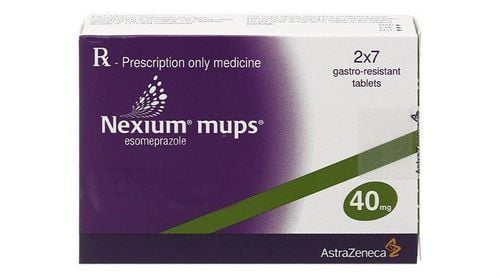This is an automatically translated article.
Among antispasmodic drugs, antispasmodic smooth muscle is widely used in treatment. In order for the use of antispasmodics for children to be safe, users need to be aware of the adverse effects of this drug.
1. What is smooth muscle?
There are 3 types of muscles in the human body (cardiac, skeletal and smooth muscles). In particular, a collection of smooth muscles (skeletal muscles) usually surrounds the ducts in the body (bile ducts, urinary tract, uterus, vagina, blood vessels, airways in the lungs, bronchi, and bronchioles). esophagus ...) or hollow organs (intestines). The contraction of smooth muscle is beyond human will. This means that humans have no control over their activities. Smooth muscle is the type of structure that makes up the internal organs of the body.
Humans cannot control smooth muscles in the body, so when there is a problem they need a separate drug to reduce the level of pain. Medicines are often very effective for digestive problems. However, when using it, special attention should be paid, especially when used for young children because it can fade symptoms of severe disease or appear some unwanted reactions of the body.
2. Some drugs for pain relief, antispasmodic smooth muscle
Buscopan drugs: This drug has the effect of causing antispasmodic effects on gastrointestinal smooth muscle, biliary, urinary - genital tract... in a number of diseases: gastric ulcer - duodenal ulcer, irritable syndrome enteritis, cholecystitis, pyelonephritis, cystitis, kidney stones, cholangitis, pancreatitis, dysmenorrhea, ...
Atropin is used to inhibit the effects of the parasympathetic nervous system. This drug is used in many cases such as disorders of the digestive system, irritable bowel syndrome (drugs that work to reduce colon spasms, reduce secretions), peptic ulcers - duodenal ulcers (drugs that affect the colon). Used to inhibit gastric acid secretion), symptomatic treatment of acute or chronic diarrhea due to increased intestinal motility and other disorders with smooth muscle spasms. In addition, atropine is also used to treat bradycardia caused by digitalis poisoning. Treatment of organophosphate poisoning, bronchospasm, prevention of motion sickness, treatment of mydriasis or in case of inability to accommodate the eyes...
Papaverin: classified as an anti-inflammatory pain reliever spasms have muscle-directing effects, used to relieve pain due to increased peristalsis - stomach due to uterine spasms, renal colic, biliary (in nephritis, gallbladder)... Papaverin is also anti-spasmodic. constricts cerebral and peripheral blood vessels, relaxes the myocardium. Previously, the drug was used in cerebral ischemia, myocardial ischemia, asthmatic bronchospasm, angina pectoris. Spasmaverine: Symptomatic treatment of pain caused by dysfunction of the gastrointestinal tract and biliary tract, pain caused by spasms in the urinary-genitourinary tract (dysmenorrhea, labor pain, renal colic and urinary tract pain). , threatened miscarriage, strong uterine contractions). Spasmaverine can be used in cases of glaucoma or prostate enlargement.
3. How do smooth muscle spasm relievers work?
Smooth muscle makes up the internal muscular system such as the gastrointestinal tract (esophagus, stomach, intestines), bronchioles, bronchi, bladder, ureters, urethra, blood vessel walls, iris muscles, ciliary muscles , erector muscle, uterus, ducts of glands. The contractions of smooth muscles are out of our control, which means we have no control over their movements.
Group of smooth muscle relaxants have the effect of relaxing smooth muscles, reducing the intensity and speed of smooth muscle contractions. This helps to reduce pain during contractions. This group of drugs is widely used in the treatment of pain caused by spasms of the biliary tract, gastrointestinal tract, urinary tract and genital tract.
When using drugs, special attention should be paid. Because the drug can alleviate the symptoms of severe disease or appear unwanted reactions on the body.
4. Note the adverse effects
Buscopan may cause dry mouth, sweating disorders, heart palpitations and possible urinary retention. However, the symptoms are usually mild.
Note
Do not use Buscopan in injection form in cases of glaucoma disorders, prostate enlargement with urinary retention, mechanical narrowing of the gastrointestinal tract, tachycardia, myasthenia gravis. The oral form should not be used in patients with angle-closure glaucoma as well as in patients with intestinal or urinary tract obstruction and in patients with tachycardia. Atropine drug may appear some symptoms when taking the drug such as: dry mouth, difficulty swallowing, difficulty speaking, increased thirst, fever, decreased secretions in the bronchi. The toxicity of papaverin is low after oral administration. However, in fact, there have been cases of drug use with gastrointestinal side effects (nausea, constipation, loss of appetite, diarrhea), dizziness, somnolence, sedation, lethargy, headache, hepatitis and liver hypersensitivity,... reported. Therefore, papaverin must be used with caution in patients with glaucoma. Do not take the drug for a long time, because it can lead to dependence on the drug. Discontinue papaverin when symptoms of gastrointestinal upset, jaundice or changes in liver function test results occur. Hopefully, the above sharing will help parents better understand about antispasmodic drugs for children. If you have any further questions, you can talk to your doctor to get the necessary indications.
Please dial HOTLINE for more information or register for an appointment HERE. Download MyVinmec app to make appointments faster and to manage your bookings easily.













